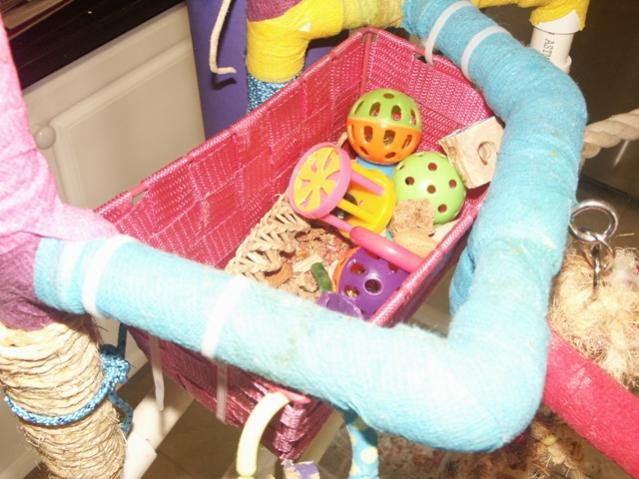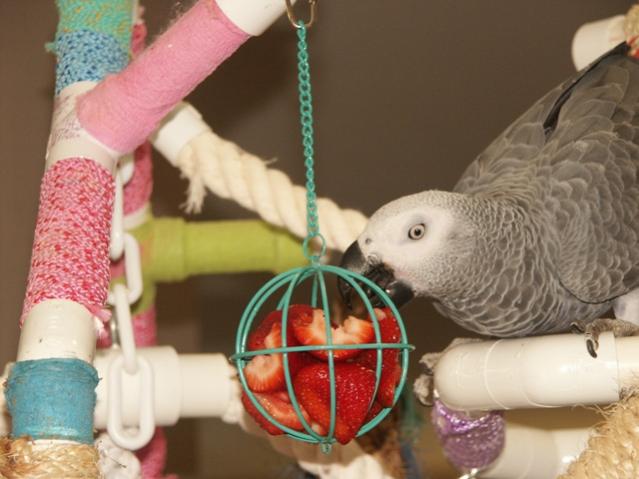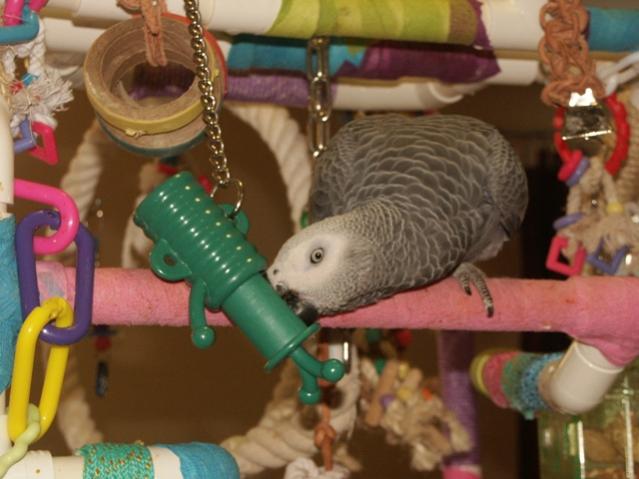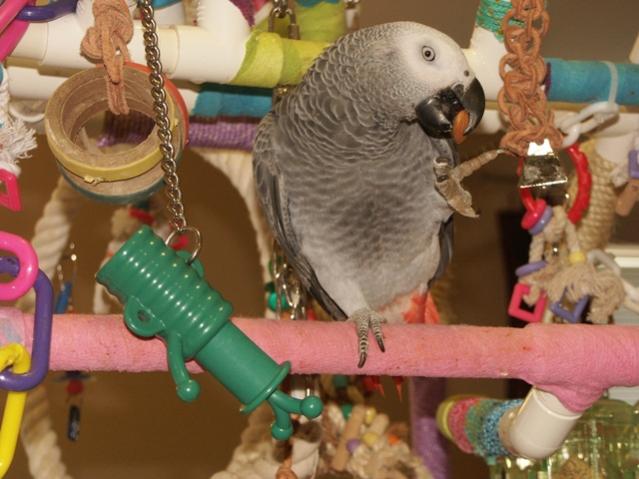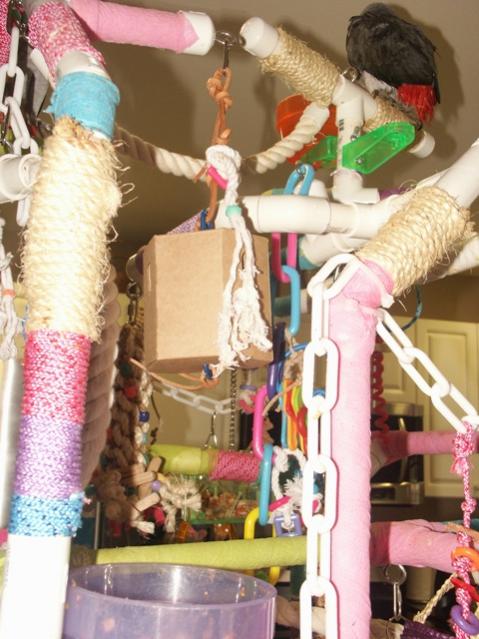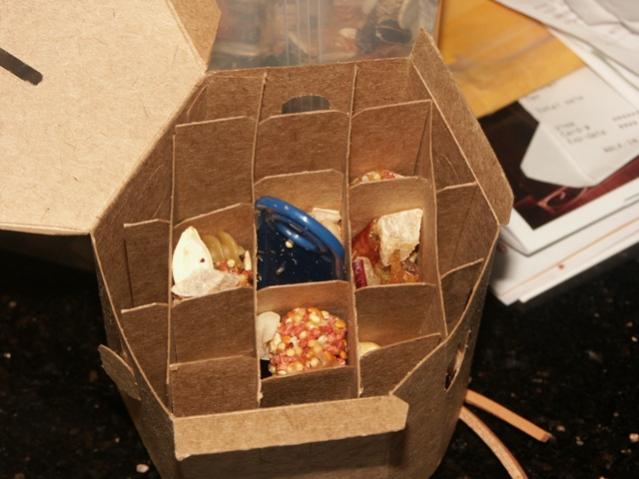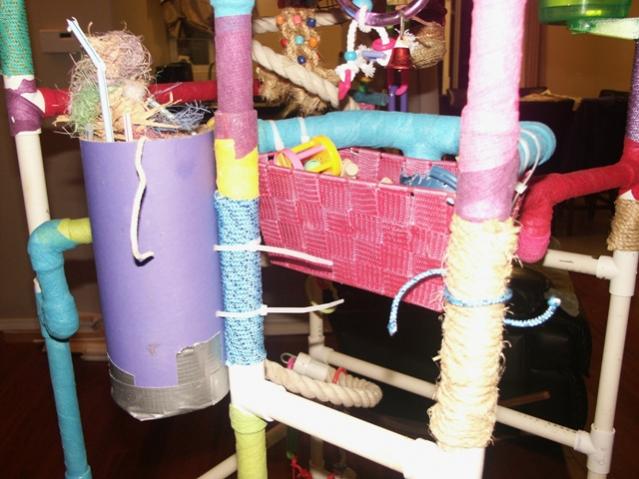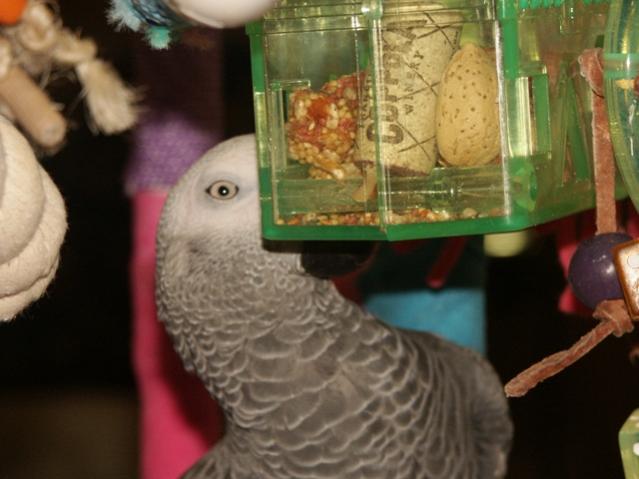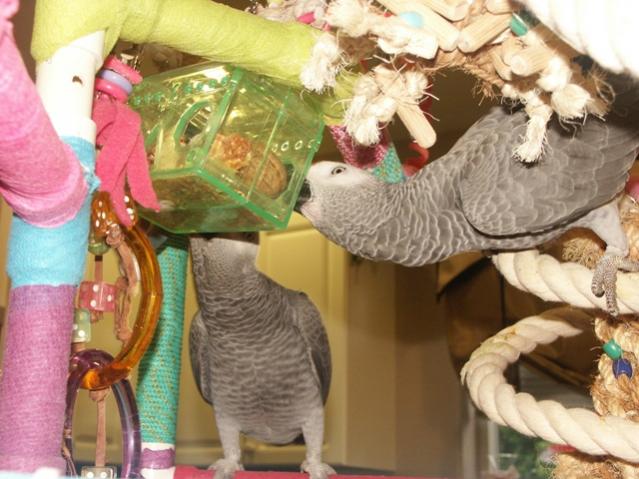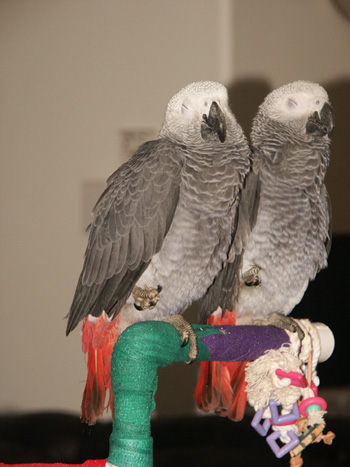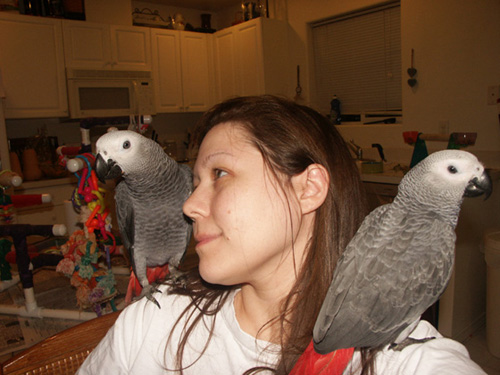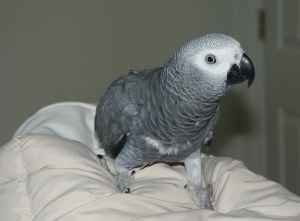NEW ADDRESS FOR MEMBERS GREYFORUMS.ORG
-
Posts
193 -
Joined
-
Last visited
Content Type
Profiles
Forums
Events
Gallery
Everything posted by zandische
-
Had to split up the thread to share the pics! Here's more: Other foraging things I've done - hang a shallow basket (2-3 in deep) off a perch and pile in foot toys. Drop a couple almonds or nutriberries in the bottom and watch the fun as they throw everything on the floor to get down to the bottom. Along the way they will usually play with a few toys before remembering they were after a treat. I use various size baskets from fairly large to very small and hang them wherever they fit. I have a durable nylon basket for their foot toys that is mounted to their playstand and then I use other baskets made out of woven grass or untreated wood and hang them. They have fun shredding the basket as much as getting the treat. I try to give a variety of "easy-to-reach" baskets and some that they have to work to get to by climbing or hanging off of perches. Pinatas (the grass woven kind, not the resemble-a-real-pinata kind) - hide seeds and treats in between the woven grass parts and let the birds shred away. Again, in the hamster/gerbil section at the pet store they sell powder-coated treat balls. These are basically just a slotted wire ball that is powder coated. The slots are a little big, but work well for things like fresh strawberries, stalks of kale, apple slices, carrot sticks or brocolli. I also have a forage barrel by Foragewise - this isn't much of a challenge for them now, but they love seeing it because they know exactly what I put in it - almonds, their favorite treat I am looking forward to other people's ideas too...my birds love to forage and figure out puzzles, so I am always looking for new things for them to get into! Lovethatgrey - I'll see if I can get pictures of the foraging toys I have up now for examples!
-
My birds love - and i mean LOVE - their treasure chest foraging toy. I'm not sure who makes it, but it's pretty common in the acrylic or foraging toys section in the parrot stores. They chewed up all the blocks that came with it, so now I put in wine corks, shelled almonds or nutriberries. Just like Emma, they will spend a lot of time trying to get every last crumb! I really like the buffet ball though...I think I might give that one a try next! I bought one of those "chubes" for hamsters that come with nesting material inside. Took out the nesting material, drilled holes through the cardboard, cut out a cardboard bottom from a box I had lying around and sealed the bottom with duct tape. Then I zip-tied it vertically to the side of their playstand and filled it with long shredders, vine shredders, the old torn-up leavings of pinatas and drinking straws (which are possibly the cheapest bird toy you can find.) It acts as a preening toy and as a foraging basket. Creative Foraging Systems - the cardboard boxes are AWESOME! These don't last long in my house. They are basically a box with tons of little slots inside. I let the birds watch me fill up the little slots with all kinds of seeds, nutriberries, and almonds. Then I hang it up and watch them tear it apart to get to the inside. It's like unwrapping a never-ending present. A very cool foraging idea!
-
I'll add my experience to this thread. Perhaps it will help you or someone else, Fred. Keeping a parrot flighted is a difficult decision. My first grey and I were extremely close in a way I have not found with any other creature. I wanted her to be flighted because it made her deliriously happy to fly around the house and my goal was for her to be able to live life as an independent, valued member of our household. Her ability to fly gave her the option of choosing when she wanted to be with us, challenging us to think about things her way, and allowed her to develop her decision-making skills to the point that she was an extremely outgoing, confident bird. I worked with her on recall training. I could call her anywhere in the house and she would come to me. I hadn't started recalling her outside yet, but I took her outside often in the aviator harness and she was learning to get used to the outdoors. She had taken many car rides and loved the car. Also, we taught her to hone her flying abilities by providing challenges - narrow door openings, different-sized perches and unbalanced perches, etc - to the point that she was an extremely agile flyer indoors. Her escape was a freak accident. A cat came on the back porch and spooked her on her playstand nearby; as she flew away in a panicked flight from the kitchen, my husband happened to come in through the front door at the same moment. Utilizing her agile flight skills, she folded her wings up and shot between his head and the door jamb - passing through a space barely bigger than 8 inches. He had failed to do the "bird check" before opening the door - that is, to open an inch or so and listen for the sound of beating wings. We have never found her, despite spending countless hours, time and money searching all over the state and answering numerous prank, drunken or completely dead-end leads. We were able to help rescue 2 other greys, a parakeet and a cockatiel during our search which is somewhat heartening. It was the most painful loss I've ever experienced - not only because of the bond we shared, but because I was sick with the thought that she was scared, hurt, or caught by the kind of person who would not try to find her owner. Despite all the training she had and the bond we shared, when she flew out the door she did not come back. We now have two young greys and we are trying to start again. These greys came already clipped; the breeder had clipped the first 7 feathers on each bird and it has been heartbreaking waiting for those feathers to grow back in. Our little girl has lost all of her tail feathers because she tries so hard to fly and then drops like a rock, landing on her rump and breaking the feathers off. Our boy is a great flier and will probably be extremely healthy when he gets his feathers - even with 7 clipped, Gryph has enough strength and stamina to fly/glide well over 40 feet. I have a feeling that when he can maneuver and get lift he will be a handful! So, to the actual point of this long response - I have had parrots in both flighted/non-flighted situations and lost a flighted parrot who did not come back. I will allow my parrots to be flighted again, because I believe it improves their health and confidence. But it wasn't my parrot's fault that she didn't come back when she escaped; you can't expect a terrified bird to know her way home any more than a 3 year old left in a shopping mall, and especially when that lost bird still has most of her wild instincts. The truth is that it was our fault for providing the opportunity for escape. Whenever we take a parrot into our home - regardless of whether we choose to clip or not, whether the parrot is a genius or whether they have been recall-trained - we must take responsibility for doing everything possible to keep the bird safe. It is so easy to see our parrots (especially Greys!!!) as people who can reason like people do, but we must understand that they are wild-at-heart animals with very basic instincts. We are their caretakers - soldiers even - standing guard for our fids. We must understand that if we cannot protect them, then we may have to face a situation like I did above. That being said, the joy of sharing my life with a grey is unparalleled. I am, and always will be, a grey person.
-
Thanks for the great feedback, Dave! I guess I'm just over-analyzing things! They do get a long really well, until the little one (who thinks she's the boss) decides to impose her will on her much larger (by 100grams) brother. It's quite comical at times. Thanks for setting my fears aright.
-
Hey guys! I'm having a bit of bird trouble! In November I brought home 2 four month old CAGS who were from the same clutch. They are sweet and gentle and very inquisitive. Now, almost 8 months later, they are becoming a handful. The girl, Seraph, seemed to really like my husband at the breeder, but since she's been home she's been trying to bond to me. I say "bond", but she really only seems interested in getting scratches from me, and I guess I give better scratches than he does I've been trying to limit my interaction with her so he has more of a chance to bond, but she is persistent! The boy, Gryphon, is a very shy and sensitive bird, and he is pretty much attached to me at the wing. He won't let me go anywhere without him. But he is classically reserved and disinterested in snuggling. He just wants to sit on me and watch what everyone is doing. Which is just fine by me! Both birds are interactive with us and like us both, although they both generally seem to prefer me over my husband. Their cages are placed next to each other and their playstand and they spend the majority of their day out of their cages roaming from stand to cage and back again. We always include them in whatever activity we're doing, so they are generally the center of our attention. Both birds like each other and will preen each other often. They fight like brother and sister - he'll take her toy, she'll take his - and sometimes they get annoyed with each other if they're sharing the same space, but they get along pretty well. But yesterday I caught Gryphon being WAY too sweet to his sister. He had the droopy wings, the begging sounds and was trying to regurgitate for her. When she realized what he was doing, she started trying to regurgitate for him. I immediately separated them, but now I'm worried! These guys are only a year old, and I didn't think that sexual behaviors started until at least 2, and usually not until 3 or 4. Is this just a normal baby-sibling behavior, or are these guys potentially developing a mate bond? He has made droopy wings to me before, but never like that. How can I get their bonds back on track with us humans? Should they spend more time apart during the day? One thing I'll note: we recently brought our outdoor cat back inside (been about two weeks now.) She is an old cat who has never been interested in anything that is not a lap, but obviously the birds are wary of her. Gryphon in particular has been a bit peeved with me when I let her on my lap and he's not on me as well. I know this because when he's on me and the cats on me he is relaxed and sweet, but when he sees the cat get on me and he's across the room, he stops whatever he's playing with and watches me like a hawk until I push the cat off my lap. Could his sexual behavior toward his sister be an "acting out" of jealousy issues because of the cat?
-
Thanks guys! You are all right, they just need time and patience! I have been giving each of them at least a 1/2 hour of 1-1 time each morning and that is helping. Seraph has always been the more out-going of the two, and she fell head over heels for my hubby. She has been a real lover to me, but last night he came home from a few days of travel and she about smothered him with bird kisses. Gryphon has a more reserved nature. I thought maybe he didn't like me after all when we got him home, but I think he is just not super cuddly. He doesn't mind being touched but unless he's sleepy, he acts like scratches are a huge bother! But I think he is warming up to me - the other day he tried to regurgitate and feed me, then last night he went exploring when I dissappeared to go do some cleaning (and he got really excited when he finally did find me) and this morning he finally came out of his cage to greet me with kisses AND wanted scratches. He has been giving me kisses all day now. He seems to be happiest just sitting on my shoulder and not getting bothered, so that's what most of our 1-1 time has consisted of. So maybe I just need to relax and let it all happen "by the bird!" Here's a pic of them today after playing all morning...
-
Thanks guys! Do you guys think it is ok to have their cages right next to each other, or should they be spaced across the room?
-
-
Ok, let's see if I can post pictures :laugh: The good news is that we brought home the little girl from the clutch too, and we decided to rename both birds to "Gryphon (boy) and Seraph (girl)" My boy Gryph is who I'm looking at (he had just preened my face in this pic) and Seraph is the sweetheart on my other shoulder. Both birds are adorable, gentle and very laid back! The bad news is that I think getting two was a big mistake! So far, my sweet Gryph and Seraph seem only interested in each other!!!! Ugh. I'm at a loss. They seem to include us at mealtime and after dinner for about an hour will perch on my shoulder and preen me, but they mainly want to be together, and they save the real "snuggling" for each other instead of us. They are only 4 months old though! Has anyone gone through this? Can anyone offer advice for keeping them from bonding too closely? Should I be worried about this or assume that as they mature, they will eventually bond more strongly with us than each other? I don't mind them being buddies but I don't want to just be the prep cook of the flock! Post edited by: zandische, at: 2009/11/11 08:17<br><br>Post edited by: zandische, at: 2009/11/11 08:18
-
Well, it's been a long haul. Losing Athena was the most traumatic experience of my adult life. It's still very painful. I miss having a grey in my life and had hoped to find another, but my recent experiences with greys have only been more depressing than uplifting. It seems like every grey (including babies) I've met in the last month or so just really hasn't been all that interested in ME. My husband, sure, but me, not so much That's my one major requirement - the bird has to choose me. It just didn't seem like it was going to happen any time soon! Then I met Ozzy! He's such a charmer. He is the middle of three babies (just at 3.5 mos old) and is so mischievous one minute, but the very next minute he's cuddling. And even though he's in the beaky-baby stage, he's very gentle with his beak. He has NO fear of people. He's so trusting that he fell asleep on his perch with me standing right there and didn't wake up even when I began to lightly rub his head, chest and back. Eventually he fell completely over in my hand (still holding onto his perch) and slept horizontally for about five minutes until he realized what he was doing! :laugh: Anyhow, what cinched it for me was when the other babies woke up from their nap and went to eat, but Ozzy stayed right next to me. He was giving me that classic grey "appraising" look too. When I was laughing at the other birds' antics, Ozzy reached out and grabbed my hair and began preening. Finally I picked him up and sent him off to eat too, but by then he'd stolen my heart.{Love-0002011D} Oz comes home Monday, and maybe, just maybe, we're bringing home his sister or brother too! (I would tell you all about them but I don't want to jinx it just yet!) Ozzy is what the breeder named him, and I'd thought about changing it to something else (read, more dramatic etc etc) that matched his mischievous but charming personality, but "Oz" is just so easy to say. And there are so many cute combinations you can make with that one...so I think it's going to stick. Anyhow, pics to come soon! I can't wait to share Oz with you guys. You've been the best!
-
Thanks Dave! I've gotten rid of the cotton stuff. Some of the "stainless steel" is actually rusted, so that had to go too. I scrubbed the wood perches, boiled them, then baked them to dry. Everything else got boiled and soaked in vinegar/baking soda.
-
Hey everyone, I bought a cage that is in good shape, but it's been left outside for a long time and is pretty dirty. Inside it was a bunch of toys/perches, some of which are rope, leather, wood and plastic. They toys are used, but many of them are still in good or almost new condition (minus the dirt). How would you clean this to make sure there aren't any nasties that could make a new birdie sick? Cleaning the cage portion is easy, but I'm wondering about the toys and perches. Some of them are very expensive and durable, and it would be nice to keep them if possible. How would you recommend cleaning the cotton rope perches? What about wood and acrylic/plastic toys? Should I boil, bleach, use a salt water solution, etc? I'd like to clean them in a way that kills any bacteria, but doesn't leave some sort of residue behind that could hurt the bird. In the fish world we'd always bleach everything or boil it, but I don't know how well that will work on wood/cloth/acrylic for birds.
-

Lost African Grey - Hillsboro, OREGON
zandische replied to zandische's topic in Lost & Found Bird Room
I just wanted to post an update on this. Unfortunately, I do not have good news. We have never found Athena. There were a number of "sightings" or heresay sightings but none of them ever panned out. We've gone through an exhaustive search for our bird and the hope when someone calls and then depression when it's not our bird is so draining. We continue to post on Craigslist and post flyers, check the newspapers, vets, etc, but it's been 3 months now. The weather is turning cold and rainy and it reminds us all over again that she might still be out there and in need. But, I cannot live my life in misery. She took a large piece of my heart with her, but the good things she gave me are things I'll keep forever. I want very much to believe that she is warm and safe in a happy home somewhere. I can say that since we've lost her we've been involved in three separate grey rescues. We've also been able to help a number of other birds (budgies, cockatiels and an amazon) get home too. At least we've been able to help other people get their birds back. I wish one of them had been ours, but it makes me feel better knowing a few people have gotten that special miracle. I pray every day for the angels to watch over my baby, and I also pray that she found someone who is taking care of her. If she never comes home I just hope she's making someone else's life as happy as she made ours. I haven't given up hope that she'll come home some day, but I desperately miss having a bird in my life. I parrot-sit for friends on occasion and those days are just so joyful for us. I don't know when or if we'll find that "special" bird again, but we're considering opening our hearts and giving it a chance to happen. It's still a very raw wound so we'll see what happens, but I think sometimes you need love to heal those deep wounds. Thank you all for your help and prayers. You are a great community and we've learned so much from you. -

Lost African Grey - Hillsboro, OREGON
zandische replied to zandische's topic in Lost & Found Bird Room
Dan, Yes, that is my greatest fear - that whoever found my bird is growing attached and doesn't want to give her back. At this point I have to assume they've seen my info, unless they don't live anywhere nearby. I have posters at every major grocery store in the area, I post continuously on craigslist, I'm on 911parrotalert, I've alerted all the rescues and posted flyers at all the pet stores and I've contacted all the vets that handle parrots. I just find it hard to believe they haven't seen my info - especially if their "friend" (the one who mentioned the found grey to the pet store owner) is a parrot person too. Even before this experience the very first thing I would've recommended to someone who found a bird was to check craigslist or call the avian vet! And then I keep worrying that maybe they ARE looking for someone but I'm missing some major place which is the only place they're looking...Sigh. I just keep praying for the right thing to happen!<br><br>Post edited by: zandische, at: 2009/08/16 00:37 -

Lost African Grey - Hillsboro, OREGON
zandische replied to zandische's topic in Lost & Found Bird Room
Thank you everyone for your support. We are having such a tough time with this. I know you guys understand our pain. But yes, I think at this point we are getting the word out everywhere we can, so now we just have to have a lot of faith that things will work out. We recently got a tip from one of the local parrot-only stores that someone was in and said their friend recently found an African Grey. There aren't many who've gone missing in our area so there's a really good change it could be ours. Unfortunately the store owner didn't recall immediately who that person was, but she is still trying to track them down. She said they are a regular customer so maybe they will come back soon. Just keeping our fingers crossed and keeping all our information current out there...and praying like mad that if someone has our bird, they will see our info and call us! -
The worst has happened. Athena (who calls herself T-Bird) got outside on 7/13. We have done everything possible to try to find her, including posting on every website we can think of like Parrot911, PetHarbor, Humane Society, local animal shelters, calling vets, posting flyers (upwards of 500) around town at all major grocery stores, intersections, the library, churches and parks. Some people have called to say they think they've seen our bird, but no one can remember seeing the red tail. And of course, we've never actually sighted her ourselves. We haven't even heard her. We are so devestated. I probably should have posted here before but it's been so difficult to verbalize my feelings about this. We run through all the emotions on a daily basis - fear, horror, guilt, hope, motivation, devestation. I keep trying to stay positive but it's so hard when you don't know where your bird is or what's happening to her. Hopefully if someone finds her they will check here ...
-
We are thinking about adding a new family member – specifically, a pug. But our Grey is our baby (she’s currently 2 years old and shares a very close bond with both my husband and I) and I’m worried she might take a new puppy pretty hard. We work hard to socialize her with different people on a regular basis, but I’m worried mainly about jealousy and anger over a new family member that gets the baby spot. Have any of you dealt with introducing new animals or children to your parrot, and what worked or didn’t work for you?
-
Sprouts are awesome! My grey loves them and gets them for about 60% of her diet also. I used to only feed them in small quantities but my vet recommended that they be 50% or more of the diet. I do a mixture of lentils, chick peas, quinoa, broccoli, alfalfa, black-eyed peas, fenugreek, sunflower seeds and radish or mustard seed when I can get it. I soak this for 24 hours and then lay out the seeds on a plate between two damp paper towels. As long as I keep the top paper towel damp (I wet it twice a day) I have sprouts in a day and a half. I haven't been able to get wheat berries or whole oats to sprout yet. For some reason they just get soft during the soaking process and never produce tails. Anyone have tips on how to sprout these items? I'd really like to add more grain to the sprout mixture to balance it out. What's funny is that when Athena sees me making the sprouts (the rinsing/dampening towels and such) she'll come stand over the plate and make those little baby begging sounds. It's so cute and I feel so bad when I tell her she has to wait! I think I'm going to try the Sprout Master tray sprouter in the near future as keeping plates going on my counter takes up space, and I think I might want to start sprouting for myself. Has anyone tried this sprouter?
-
When you distract her, do you also praise her? Distracting is probably the best solution, but make sure you also give her lots of praise. That teaches her that her attention is better focused OFF the suit than on it. Another thing to do is associate wearing the suit with something fun, like going outside. If she's distracted with something that she needs the suit for, she may be less inclined to chew on it.
-
Mingus, just wanted to add that Jane has the right of it. Ignore the screaming, but immediately reward acceptable sounds with lots of praise and attention. I have done this with my bird and her screaming has almost completely disappeared. Once I figured out what needed to happen, it took about 2 weeks to make the screaming go away. 3 months of screaming solved in 2 weeks!
-
LindaMary and all - just wanted to add that I had a similar epiphany recently with my grey. During boarding last Christmas she picked up the most god-awful sound - it sounds like those laserbeam toy guns people (crazy people!) buy for their kids. It's horrible and we've been living with it for a few months. We tried to just ignore the sound, hoping that a lack of reaction would give her the hint, but that didn't work. Then I started doing what you figured out - after the screech, I would wait for the very next sound, which is usually a word or a softer sound, and immediately attempt to repeat the sound and go overboard with lots of praise. I'm happy to report that the screaming has almost completely disappeared! She still does it a bit in the morning after breakfast, but I figure that's her normal loud time anyway, so I let her have her fun. One lesson I've definitely learned from all of this: parrots don't simply "forget" words and sounds unless you give them a reason!
-
I use something called "Old world style Muesli" by Bob's Red Mill. This has no added sugar or salt and is made up of healthy ingredients. I feed it to my bird on a regular basis and she loves it. I also feed her a fair bit of fresh veggies/fruits and sprouts. Dried fruits and veggies (check out justveggies.com) are ok so long as they are not preserved with sugar and sulfur dioxide. ALWAYS check the label and if it says "sugar" or "sulfur dioxide" don't feed it to your bird.
-
The first time I gave it to my bird I made her cornbread (one of her favorite treats) and instead of butter I spread the oil on it. At first she wasn't so sure, but I started putting it on everything - including stuff I ate. (It doesn't taste bad, just a little earthy.) I always warm and soak her pellets in water for breakfast and dinner, so at night I started putting about a 1/4 tsp in the warmed up mash. She really likes that! Now she goes crazy whenever she sees the jar of oil. I think the trick was just to keep mixing it up in the food so she got some of it even if she was picky about what she was eating. At room temperature (about 70 degrees F) the oil is butter soft but still congealed. If you warm it up to about 80-90 degrees, it turns to a very thin liquid. This stuff has a long shelf-life unrefrigerated, and there's no need to refrigerate it. If you do, it becomes hard as a rock and you have to melt it or else you'll bend your spoons! (Trust me on that one!) Also, I always use a clean spoon when measuring out some for dinner. Since it's not refrigerated I try to minimize getting any additional bacteria (like from fresh made bird mash, which will start to decompose after a few hours) in the oil as much as possible.
-
Red Palm Oil is derived from the fruit of the dende palm, which is native to Africa. However, there are two types of palm oil that are sold; red palm oil which is made from the fruit of the palm and palm kernel oil which is made from the seed/nut of the palm. It's very important to make sure you are only buying unrefined RED palm oil that is NOT from the kernel, as the kernel type does not have the same nutrients as the red palm oil and has a much different ratio of fatty acids. (I'm sure feeding nuts in small quantities is no big deal, but it's important to understand that the nut is NOT the most nutritious part for your bird.) There are several studies which suggest the high levels of Vitamin E & tocopherals/tocotrienols in red palm oil actually help reduce cholesterol and improve the body's overall health and immune defense, but if you're only feeding the palm kernel oil then you're getting a lot more fat and a lot less cholesterol reduction. Translating this to parrots, it's been theorized that the high incidences of heart attack in captive African greys are due not so much to terrible frights or freak accidents as to a diet rich in seeds and the saturated fat diets of their owners. Although minimizing seed intake is going to be beneficial to reducing the risk of heart attack, supplementing the diet with red palm oil may also have a significant impact. A search of "red palm oil health" will return a bunch of articles on the health benefits of red palm oil. There is a large quantity of palm oil products made in South America and Malaysia which are made from the KERNEL and not the fruit, so be careful when buying this for your birds. Don't buy anything that doesn't specifically say "made from the fruit, not the kernel." (Jungle Products is what I use and is a very high quality product. I get a 16 oz jar for $12 from Whole Foods and it lasts me about 5-6 months.) Observations of wild greys show that greys forage the palm fruit (the fleshy pulp that surrounds the nut, which is where the oil is extracted from) as part of their normal daily diet. It has been suggested that because the palm oil has such a high concentration of specific nutrients (including high beta-carotenes, Vitamin E and Vitamin A), many of the problems seen in captive greys (including arterioscleroisis/heart attack, seizures, plucking, hypocalcemia, chronic sickness, dry skin etc) can be "cured" by adding red palm oil to the bird's diet. There's tons of anecdotal evidence that suggests the above is true. From my own experience, Athena gets about 1/4 - 1/2 teaspoon a day and goes nuts whenever she sees the jar of oil. She loves the stuff and will literally try to stick her head in the jar to eat it. (Which means that if I want her to eat something she doesn't like, I just melt some palm oil, coat the food and wha-la, my bird eats her broccoli without a fight! Of course, it also means I often have an orange-headed bird.) I've noticed a significant difference in the sheen of her plumage, her tail feathers are a beautiful deep red, her foot scales are shiny and black, and she is very active and playful. She has never been sick. If she gets a bump on the head (from over-zelous playing), I dab a little palm oil on it and it heals up almost instantly (thanks to the loads of vitamin A). Some great links on this: http://www.holisticbirds.com/pages/palmoiltrials0803.htm http://www.americanpalmoil.com/faq.html#1 http://www.junglepi.com/products/source_tour.html Post edited by: zandische, at: 2009/03/14 01:12<br><br>Post edited by: zandische, at: 2009/03/14 01:17
-
I use a digital scale also and weigh Athena every day. She's always been on the small side, and at 2 years old she's been holding steady at about 415g +/- about 10g either way, as Dan noted. I've read that greys aren't fully mature until they're about 4-5 years old, so I'm not sure if she's going to continue to gain weight or if this is it for her. She was pretty steady at 385 for about a year or so and then in the last six months she gained 30 grams. But I don't mind my little girl; I'm petite too so I just tell her she takes after her ma


